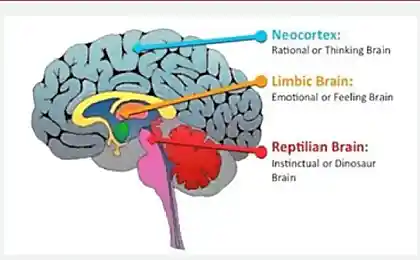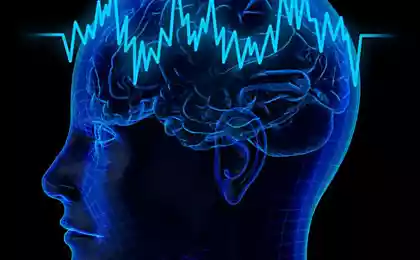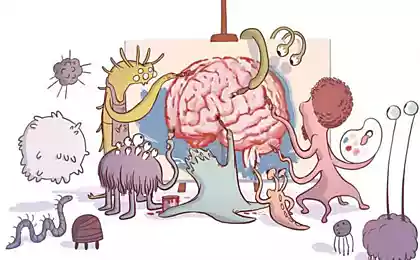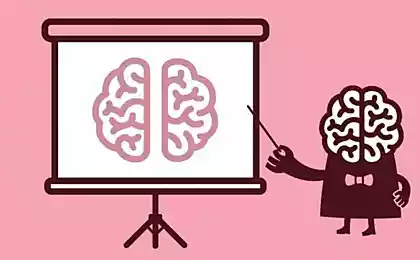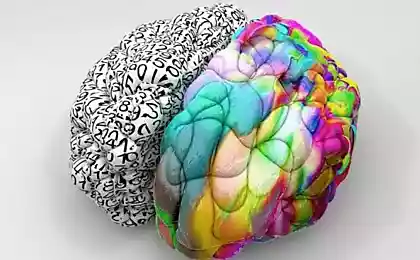599
As the sensitivity to stress depend on the brain
Sensitivity to stress is determined by the neural circuit connecting the emotional centre of the brain cortex – a high activity of this system indicates that the brain feels the stress is stronger than I would like.

Different people feel stress: someone after a scandal at work or at home for a week to go sick, and someone stress depression, bad mood and depression will disappear in a few hours. Of course, a lot depends on the genes that determine the anatomy of the nervous system. Many, but not all know that even genetically identical individuals (e.g. monozygotic twins) react to stress in different ways.
In other words, the brain can be features that cannot be calculated only by genes, but are still a strong influence on psychology (and physiology) of the body. What kind of features, trying to figure out the neuroscientists from Duke University. In their experiments, they used genetically identical mice, which were injected with electrodes in the amygdala and prefrontal cortex. Humans and mice both areas actively participate in shaping the stress response. The amygdala (or amygdala) is responsible for emotions, including fear, and with its help the individual is to decide for example what to do in case of a threat: fight or flee. On the other hand, the prefrontal cortex is responsible for higher cognitive functions – for example, for long-term planning. Under stress, it acts as an antagonist to the amygdala, suppressing panic and thereby allowing us to "live and work" even in a stressful situation.
"Listening" at the same time the activity amygdala and prefrontal cortex, were able to understand how they are closely related to each other and how responsive to each other react. Mice for two weeks were subjected to constant stress, placed them side by side with an aggressive male. Among the animals were both more susceptible to stress and less sensitive, and the activity of the prefrontal cortex corresponded with how mice cope with life's difficulties.
Neuroscientists were interested in the primary response of nervous system to stress, that is, when the mouse had just been in a bad situation. It turned out that stressfulsituation mice connectivity between the prefrontal cortex and amygdalae were generally more active, while the stress-resistant mice, this neural circuit was working in a relatively relaxed mode.
The authors of the work believed that the neural system balancing, stress will be activated only in the chronic situation – in fact, if you think logically, that the inhibitory function of the prefrontal cortex becomes needed when troubles become permanent and it becomes clear that they need to live somehow. The fact that this system begins to work immediately, suggests that stress is perceived inadequately. Perhaps, in some cases stress the neurons are so sensitive that even the primary stressful situation is similar to as if the trouble began long ago and has already managed to accumulate. The results of the experiments published in Nature Communications.
Although the study was conducted on mice, the same neural system, as has been said, works in humans. It is not excluded that the peculiarities of its functioning it will be possible to determine in advance of a person susceptible to stress. From a practical point of view, this diagnosis should help, for example, choice of work – it is clear that there are no good responsible leadership position, or service in the hot spots. It's also possible that acting on this neural network, it is possible to correct the situation and make the individual less sensitive to stress. However, one should not forget that there is genetic predisposition to stress, and, according to the authors, the combination of such features of brain work with not too successful genes can greatly increase the likelihood of serious mental illnesses, from PTSD to schizophrenia.
Author: Cyril Stasevich
Source: nkj.ru

Different people feel stress: someone after a scandal at work or at home for a week to go sick, and someone stress depression, bad mood and depression will disappear in a few hours. Of course, a lot depends on the genes that determine the anatomy of the nervous system. Many, but not all know that even genetically identical individuals (e.g. monozygotic twins) react to stress in different ways.
In other words, the brain can be features that cannot be calculated only by genes, but are still a strong influence on psychology (and physiology) of the body. What kind of features, trying to figure out the neuroscientists from Duke University. In their experiments, they used genetically identical mice, which were injected with electrodes in the amygdala and prefrontal cortex. Humans and mice both areas actively participate in shaping the stress response. The amygdala (or amygdala) is responsible for emotions, including fear, and with its help the individual is to decide for example what to do in case of a threat: fight or flee. On the other hand, the prefrontal cortex is responsible for higher cognitive functions – for example, for long-term planning. Under stress, it acts as an antagonist to the amygdala, suppressing panic and thereby allowing us to "live and work" even in a stressful situation.
"Listening" at the same time the activity amygdala and prefrontal cortex, were able to understand how they are closely related to each other and how responsive to each other react. Mice for two weeks were subjected to constant stress, placed them side by side with an aggressive male. Among the animals were both more susceptible to stress and less sensitive, and the activity of the prefrontal cortex corresponded with how mice cope with life's difficulties.
Neuroscientists were interested in the primary response of nervous system to stress, that is, when the mouse had just been in a bad situation. It turned out that stressfulsituation mice connectivity between the prefrontal cortex and amygdalae were generally more active, while the stress-resistant mice, this neural circuit was working in a relatively relaxed mode.
The authors of the work believed that the neural system balancing, stress will be activated only in the chronic situation – in fact, if you think logically, that the inhibitory function of the prefrontal cortex becomes needed when troubles become permanent and it becomes clear that they need to live somehow. The fact that this system begins to work immediately, suggests that stress is perceived inadequately. Perhaps, in some cases stress the neurons are so sensitive that even the primary stressful situation is similar to as if the trouble began long ago and has already managed to accumulate. The results of the experiments published in Nature Communications.
Although the study was conducted on mice, the same neural system, as has been said, works in humans. It is not excluded that the peculiarities of its functioning it will be possible to determine in advance of a person susceptible to stress. From a practical point of view, this diagnosis should help, for example, choice of work – it is clear that there are no good responsible leadership position, or service in the hot spots. It's also possible that acting on this neural network, it is possible to correct the situation and make the individual less sensitive to stress. However, one should not forget that there is genetic predisposition to stress, and, according to the authors, the combination of such features of brain work with not too successful genes can greatly increase the likelihood of serious mental illnesses, from PTSD to schizophrenia.
Author: Cyril Stasevich
Source: nkj.ru
8 Steps to Overcoming the Post-Holiday Mouse
Ship of plastic bottles successfully moves along the route






